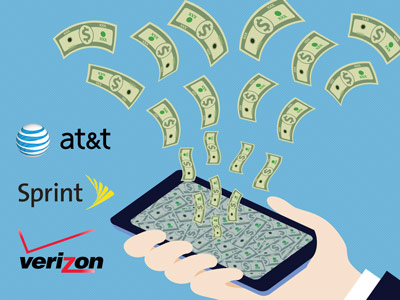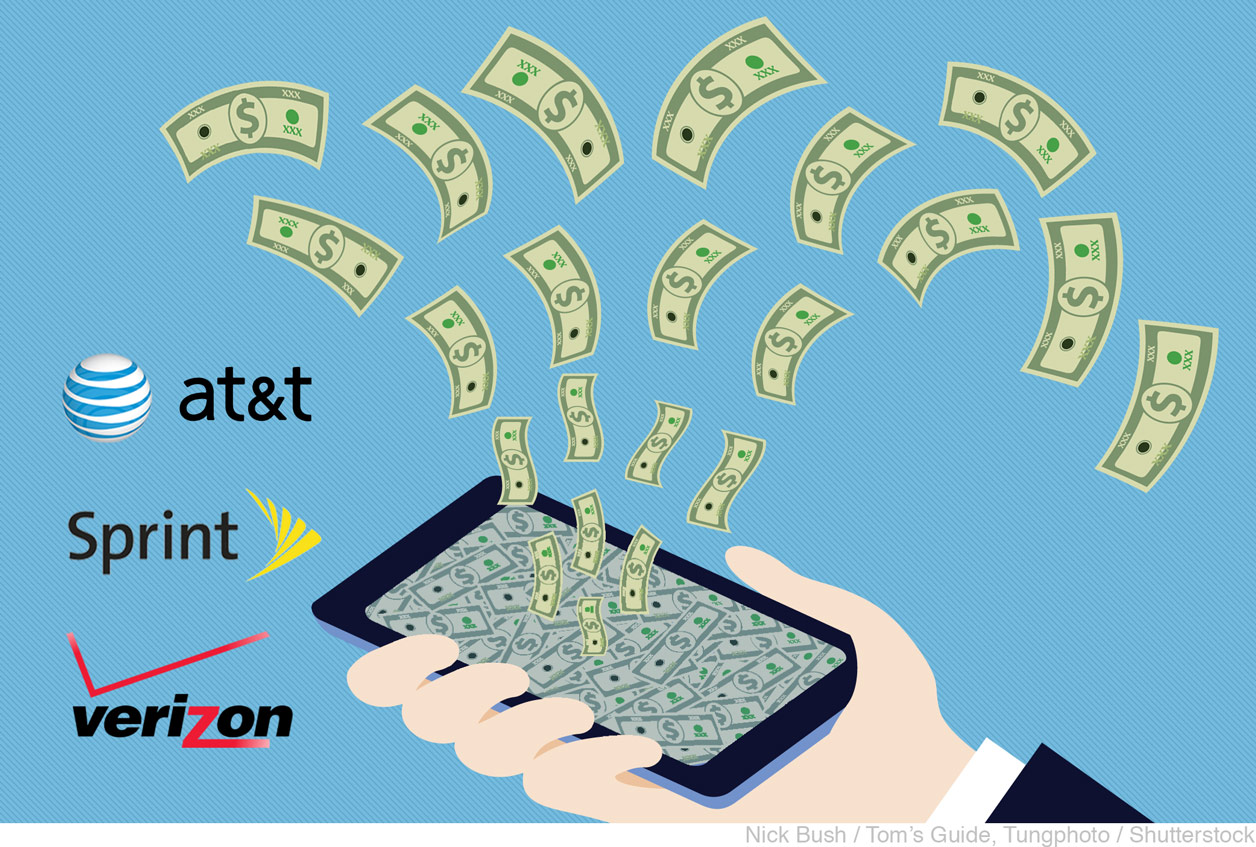Stop It: Cellphone Carrier Access Fees Are Absurd (Op-Ed)
We shouldn't be paying access fees for unsubsidized phone plans. Carriers should follow T-Mobile's lead with more straightforward billing.


Sorting through cellular plans from the national carriers can unleash a cornucopia of confusion. Consumers are forced to twist a Rubik's Cube in their heads to match up varying data allotments, phone payment options, network performance and coverage areas, data rollover offers, international usage and switching incentive specifics just to make rational carrier, hardware and service choices.
The most confusing cost to be found in all those calculations could well be the monthly access fee — the extra $15, $25 or $40 most carriers tack on to your data plan each month, which pays for … Well, what exactly does that access fee provide access to? Mostly, your money and your credulity.
Of the four major carriers, AT&T, Verizon and Sprint all add access fees to at least some of their plans, though the amount can vary. On its Mobile Share Value plans page, AT&T lays out its split-fee structure in the most straightforward fashion of those three carriers. You see the six features AT&T's plans include, the prices of the varying data buckets, and the monthly access fees based on how much data you're buying and how you bought your phone.
An AT&T phone bought on an installment plan gets charged $15 every month with a data bucket of 10GB or larger, and $25 each month with 6GB of data or less, while phones purchased in a subsidized plan face a $40 charge regardless of the data-plan size. What you won't see is an explanation of what you get for that extra access fee, just that you have to pay it.
Lynette Luna, principal analyst for consumer services at Current Analysis, said she sees access fees as a way for carriers to make plans look attractive on the surface. “Oftentimes, carriers will change their pricing structure by giving customers bigger buckets of data for a cheaper price, but then tack on those nasty access fees," she said. "The access fees also encourage consumers to buy bigger buckets of data because that fee goes down with higher data offerings."
The Carriers Respond
According to a Verizon spokesperson, the carrier's access fees are "simply the access to the network, which includes unlimited calling, unlimited texting, free NFL mobile, 25GB of cloud storage and free international text messaging." That's not what it says on the Verizon More Everything page, though. All these plan features are listed under "Here's What You Get," implying that the data bucket includes all the things that Verizon says the monthly access fee supposedly pays for.
MORE: The Best Cellphone Plans Right Now
Get instant access to breaking news, the hottest reviews, great deals and helpful tips.
The confusion increases since only Verizon's More Everything group plans carry extra monthly access fees; its individual 1GB and 2GB data plans don't have those fees. So if text and calling is included with data for individuals, what are those extra fees in the group plans for again?
Carrier claims that access fees cover nondata services are obviously absurd since the fees change depending on how and how much you pay for your phone. (Like AT&T, Verizon charges less for phones bought under installment plans than it does for subsidized phones.) After all, what does the hardware price have to do with access to the service supplied to it? It's like charging a surcharge for gas because you lease your car instead of having bought it outright.

Sprint's individual/family plans are equally schizophrenic about access fees. The carrier's new individual All-In Wireless plans include text and calling with no extra monthly fees, but its legacy Family Share Packs add on $15, $25 or $40 monthly access fees. The company's new five-line 20GB/$100 family plans eliminate the $15/month per-line access fees – but only until September 20, 2016.
At least Sprint is a bit more open about what the added monthly fee on its family plans pays for. "It is a common practice to cover costs of adding additional devices to the shared plan," Ryan Souan, Sprint's director of marketing, told us. "The data access charge is higher for subsidized devices because the customer is purchasing the device at a discounted rate."
Making Up the Difference
Access fees are largely a vestige of what soon will be just a faded memory: subsidized phone pricing.
Consumers have been coddled by paying almost nothing for their expensive smartphones. Carriers, however, lose money on each subsidized phone they sell. Verizon thrilled its subscribers when it finally began to sell the iPhone back in 2011. But the more iPhones Verizon sold, the more the carrier's profits dipped. This higher-volume, lower-profit problem was more acute at iPhone's original carrier, AT&T, and even at Sprint. The sales success of the iPhone and subsequent flagship smartphones became every carrier's accounting nightmare.
To make up for these subsidized hardware loss-leader losses, carriers constructed a convoluted system of two-year contracts with stiff early-termination penalties and (shhhh!) small-print monthly access fees. Carriers rationalized access fees with convoluted logic to hide their profit makeup purpose and to maintain the illusion of bargain-priced hardware. Carriers were unable or unwilling to change this dynamic, fearful that consumers would balk and walk if suddenly forced to pay full price for their phones.
Until March 2013, that is, when perennially fourth-place carrier T-Mobile, with nothing really to lose, eliminated subsidies, and with them, monthly access fees. "We don't believe in data-access fees," T-Mobile CEO John Legere said earlier this year. "We just think they're wrong."
The End of Subsidies
When T-Mobile's business didn't crumble while charging its subscribers full price for hardware – in fact, it thrived – other carriers mustered the courage to change as well. In short order, AT&T, Sprint and Verizon each began to offer three ways to pay for phones: subsidy, equipment installment plans (EIP) or full price up front.
But this trio of payment choices is likely to soon become a duo.

AT&T, Sprint and Verizon all have reported increasingly higher percentages of consumers opting for EIPs rather than buying subsidized phones. Consumers, however, aren't necessarily volunteering to pay full price. They're enticed, ironically, by lower monthly access fees for phones bought at full price versus the ones bought on subsidy. Once you do the math and account for the access fees, paying full price for your hardware actually turns out to be the cheaper option.
But if you're paying full price via an EIP for your phone — meaning your carrier is no longer losing money on the hardware — then why the extra $15 a month access fee? That's a question no carrier can answer with anything other than marketing double speak.
Thankfully, among the four major carriers, only AT&T still charges a monthly access fee on individual plans, which is a bit weird considering how unusually vocal AT&T Wireless CEO Ralph de la Vega has been in declaring the death of subsidies. But AT&T, Sprint and Verizon still charge these unjustifiable and stupid access fees for family plans, even when consumers pay full price for their phones and carriers are posting profits from hardware sales.
While T-Mobile has kept rival carriers on their toes, other pressures may force carriers to do away with access fees sooner rather than later. "Carriers that do charge an access fee will struggle going forward if they want to play more aggressively in the connected-devices game," Current Analysis' Luna said. "How many access fees are they going to charge when someone wants to connect their smartphone, tablet, camera [and] smartwatch?"
Even now, there is simply no reason for carriers to continue to confuse consumers with completely unnecessary, unexplained and archaic access fees. As T-Mobile and now, Sprint, with its David Beckham-led All-In "make things simple" campaign, have shown, eliminating access fees creates great opportunities for carriers to promote their offerings. Better yet, consumers are less confused, and a less confused consumer is a happier consumer, one less likely to bolt for a carrier offering a more straightforward wireless plan.
-
gopher1369 I live in the UK and keep seeing articles like this. I feel so, so sorry for you guys in the US. This is roughly how it works here in the UK, simplifying, but it's pretty much like this:Reply
Want just a SIM with mins/texts/data? £15 a month
Want a SIM + an older phone, say an LG G3, £25 a month
Want a newer phone, say an LG G4, £35 a month
You pay nothing additional for the phone, it's all incorporated into the monthly line rental. There are no additional charges, no fees, nothing to pay up front, that's it, just one fixed monthly amount for 2 years.
I completely fail to understand why the US market works in the way it does when all you have to do is look at the UK market and copy that, it's just so, so much simpler. -
nukemaster ReplyI live in the UK and keep seeing articles like this. I feel so, so sorry for you guys in the US. This is roughly how it works here in the UK, simplifying, but it's pretty much like this:
Greed.
Want just a SIM with mins/texts/data? £15 a month
Want a SIM + an older phone, say an LG G3, £25 a month
Want a newer phone, say an LG G4, £35 a month
You pay nothing additional for the phone, it's all incorporated into the monthly line rental. There are no additional charges, no fees, nothing to pay up front, that's it, just one fixed monthly amount for 2 years.
I completely fail to understand why the US market works in the way it does when all you have to do is look at the UK market and copy that, it's just so, so much simpler. -
gopher1369 But surely if just a single company came along and offered deals that, well, weren't shit, wouldn't everyone jump on that immediately and force all of the other cell companies to follow suit?Reply
